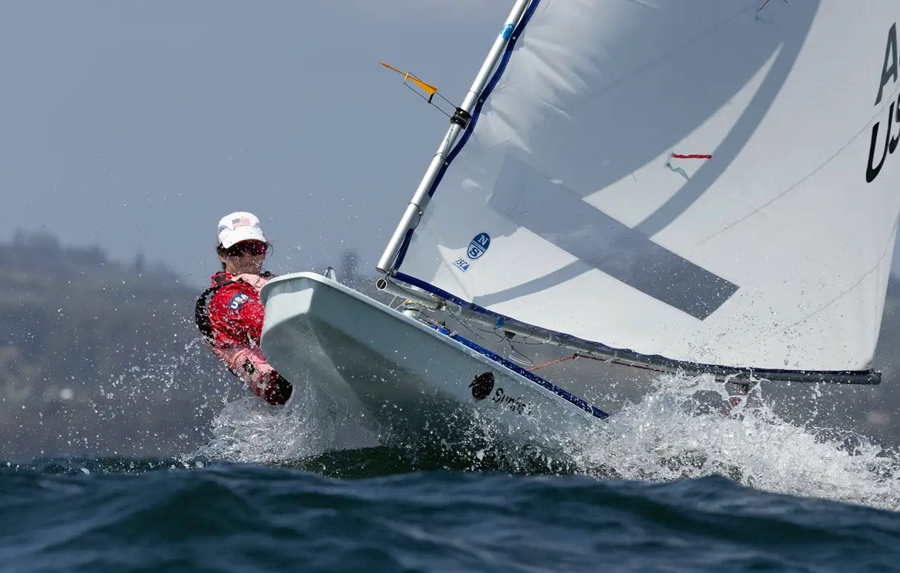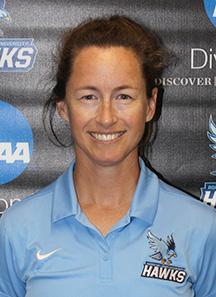Canton native harnesses wind and water
By Candace ParisAmanda Callahan has truly mastered two of the elements: wind and water. Her expertise in sailing has enabled her to compete at the highest levels. Sailing in the Sunfish class, she represented Team USA in the Pan American Games in Chile in November. More recently, she raced in the Sunfish World Championship, held in Miami December 5-9.
Sunfish are distinctive. Their sails are equilateral triangles, typically sporting brightly colored, wide stripes. Often seen darting about lakes (including Lake Massapoag) and protected harbors on casual sails or organized races, they are minimalist boats. With only a footrest cockpit, their hulls more closely resemble a surfboard than a traditional dinghy hull. They are simple to use even for children and are virtually unsinkable. So the idea of major Sunfish class competitions in open waters may seem unexpected.
But their stability makes sailing in rougher conditions possible, and their popularity, simple rigging, and common use by kids in no way diminishes the challenge offered by high-level racing.
“I’m still learning,” Callahan said. “It’s always fun to challenge yourself.”
Growing up in Canton, Callahan wasn’t always passionate about sailing. Her parents had done some sailing before their children were born and then started taking them on cruise outings off Cape Cod when they were young. But it wasn’t until Callahan’s years as a Galvin Middle School student that she fell in love with the sport. She was enrolled in lessons at the Wessagusset Yacht Club in Weymouth where she learned on a turnabout, a small (just under 10 feet) dinghy often used for teaching. When she got her first taste of racing, she was captivated.
Callahan chose to attend high school at Notre Dame Academy in Hingham, in part because it has a sailing team. After graduation in 1998, she further honed her skills while sailing for Hobart and William Smith Colleges in Geneva, New York.
She started college coaching at Tufts University, then moved to Stanford University as assistant coach. In 2007, she was named head coach of the sailing team and assistant athletic director at Roger Williams University in Bristol, Rhode Island. The team is one of the strongest in the country. In the Inter-Collegiate Sailing Association (ICSA) rankings for 2023, Roger Williams is ranked seventh in the open sailing category and 20th in the women’s category.
Callahan’s home waters are Mt. Hope Bay, RI. She said that conditions in Miami were not so different from what she typically encounters, other than the obviously warmer temperatures. She noted that the breeze was good — always a concern for sailors. The World Championship was a demanding regatta, consisting of three races on each of the four days. Callahan summarized the event by saying, “I was happy with how I sailed the last day of the regatta.”
In Chile, there were only two races daily, but overall, conditions were more challenging. The race course was set up three miles off the coast, which meant sailors sometimes had to contend with waves that were up to three and a half meters high. In that meet, Callahan finished eighth overall in Women’s Sunfish. Sailing in seven different classes (types) of boats, the U.S. Sailing Team as a group brought home nine medals.
Sailing can be very expensive. To get seriously involved, sailors must accept some physical discomfort such as getting wet, occasionally in extreme weather. The time commitment is also significant, often including driving to the water and laborious boat maintenance. Sailing can be hard on the body or even dangerous. In short, it requires special dedication. Yet it also offers constant variety and challenges.
Aside from ever-changing wind and water conditions, Callahan said that each race is different. A committee designs the course ahead of time and releases instructions for entrants to study; some courses offer up to seven options. Buoys are set up as markers, and each boat must pass them according to the pre-determined pattern. Speed is important, but so are details like adhering to the many rules governing sailing, such as those pertaining to right of way — which means that sharpened awareness of 365-degree surroundings and quick, strategic decision-making are critical.
Callahan loves Sunfish racing. “The people in the class are just fantastic and generous!” she said.
She also cited its relative affordability (compared to other classes), ease of sailing, and how it accommodates different sizes of people. She even described her recent compressed schedule of two major competitions in a short space of time as a plus. “It gave me a lot of focus to get to the gym consistently and on the water for practice,” she said.
A major player in her sport, Callahan made history in November 2020 at the Midwinters Regatta when she placed first overall at the Sunfish U.S. National Championship, competing against 33 other boats. She was only the second woman to do so, with the first achieving that in 1986.
Callahan suggests the community boating programs in Boston and Providence as resources for anyone wanting to get involved in sailing. “You have to travel a little bit to sail,” she said, noting the many great sailing areas around the region, from the north shore to Newport.
Short URL: https://www.thecantoncitizen.com/?p=121153












